Undergraduate School Course
Training Course for School Teachers
National Language Education
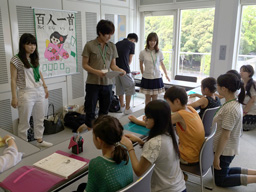
Subjects students will master in this course include Japanese linguistics, Japanese literature, Chinese classics, Japanese education, Calligraphy, and Japanese education teaching methodologies. Students will move from a general perspective of the course in their first year to more detailed, specialized discussions in subsequent years. Through these studies, students will discover and develop a particular field that holds special interest for them. In their third year, instruction becomes more diversified, including seminars, and students will gain the skills to perform independent research in the field of their choice. In their senior year, students will complete graduation thesis as a research outcome.
Staff
- SATO Takahiro, Professor
- YASU Naoya, Professor
- YAMADA Toshihiro, Professor
- KOBAYASHI Kazutaka, Professor
- YOSHIKAWA Satoshi, Associate Professor
- SUEMATSU Misaki, Associate Professor
Social Studies Education
History
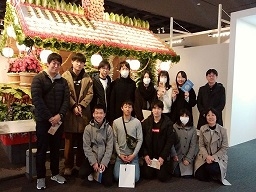
The goal of the Social Studies Education Course is to help students understand the relationship between human beings and society so that they can think about various social issues and acquire the qualities necessary to become teachers who can help build a better society. In order to understand the relationship between human beings and society, students will study specialized knowledge across disciplines with teachers of Japanese history, Western history, geography, Eastern philosophy, economics, law, and politics. In order to apply the specialized knowledge learned in this way to the classroom, students study social studies education methods and acquire the qualifications to become teachers through educational practice and other practical activities. The Social Studies Education Course will not conduct entrance examinations for each of the three majors (Geography, History, and Modern Society) from the 2021 academic year. Students will be assigned to the following laboratories after the educational practice in the second semester of their third year.
Staff
I. Social Science Educational Studies
- SUMOTO Yoshio, Professor
- TANAKA Noboru, Associate Professor
- SUNAI Naoko, Associate Professor
II. Japanese History
- TAZAWA Haruko, Professor
III. World History
- TSUJIMOTO Satoshi, Associate Professor
IV. Human Geography
V. Regional Geography
- HASHIMOTO Misao, Associate Professor
VI. Eastern Philosophy
VII. Law
- SAKAMOTO Kazuya, Professor
VIII. Economics
IX. Politics
- KAMINO Tomoya, Associate Professor
Mathematics Education
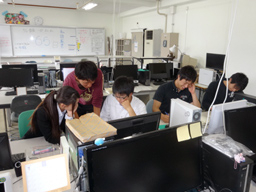
The course has been designed to provide a consistent education in the various fields of mathematics through all four years. After mastering the basics of such fields as algebra, geometry, analysis, applied mathematics, and mathematics education teaching methodologies, students will complete a graduation thesis under the guidance of a supervisor, on a selected topic in order to deepen one's understanding and application of the course of study. Through this curriculum, access to employment as an elementary, junior or high school instructor, businessperson, or public employee will be enhanced.
Staff
- YAMADA Masahiro, Professor
- KAWASAKI Tetsushi, Professor
- TANAKA Toshifumi, Associate Professor
- HANAKI Ryo, Associate Professor
- HISHIKAWA Yosuke, Associate Professor
Science Education
Physics
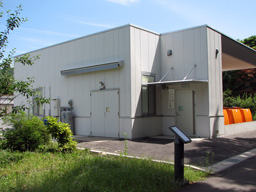
This course concentrates primarily on experimental research aspects of those fields peripherally concerned with particle physics and physics education.
Staff
- SUMIHAMA Mizuki, Associate Professor
- NAKAMURA Taku, Associate Professor
Chemistry
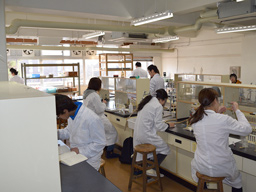
The curricula are designed to understand the fundamental behavior of matter and many chemical phenomena. Through a hands-on approach, students will acquire practical technical skills and gain valuable insight into the fundamental behavior of matter. During this process, students will also cultivate keen powers of observation and a powerful ability to successfully collate data. From observation and experiments students learn the way to teach science to pupils and students in primary, junior high and high schools.
Staff
- YOSHIMATSU Mitsuhiro, Professor
- UTSUMI Yukinori, Associate Professor
- HAGIWARA Hiroaki, Associate Professor
Biology
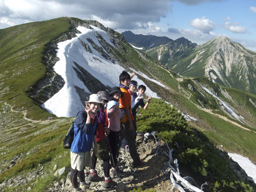
Biology is composed of many fields (genetics, morphology, cytology, ecology, physiology, and so on) . First, students will observe living organisms in the laboratory and in their natural environment, and then investigate their results on a theoretical, systematic basis. Since biology is concerned with the study of living organisms, the course is divided between lectures and fieldwork in the first three years. Then, in their senior year, students spend most of their time applying the basic concepts they have studied into research of a selected topic for their graduation thesis. Through this process, many graduates have gone on to do graduate work not just in this faculty, but in other faculties and universities as well to fulfill their quest to become expert researchers.
Staff
- KOYA Yasunori, Professor
- MIYAKE Takashi, Professor
- SUYAMA Chika, Associate Professor
Earth Science
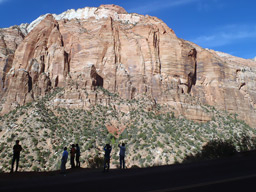
The planet we inhabit is a large sphere (space) with a radius of approximately 6;400 km, and its history (time) dates back approximately 4,600,000,000 years. Our Earth is one planet in our Solar System which is just one fixed star in the Galaxy. One goal of the study of Earth is to elucidate phenomena, movements, and history that have occurred up to now over the vast regions of space and time of the planets and their environments in space. Studies cover a broad and varied spectrum of fields of inquiry stretching from stars that shine in the night sky to minuscule phenomena that occur on Earth, including internal structures of planets, and problems of natural resources, environment, and natural disasters that afflict man today. It's such a vast field, we must admit we can only learn a small piece of the vast puzzle that makes up natural phenomena. Prospective students who have inquisitive minds, are confident in their physical abilities, and have a keen desire to unravel the mysteries of natural phenomena, are especially welcome.
Staff
- KATSUTA Nagayoshi, Professor
- MORIMOTO Maki, Associate Professor
Music Education
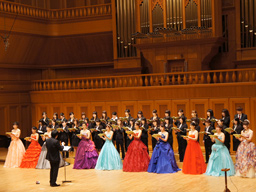
With spring and autumn providing the vivid colors of blooming red, white, and pink roses in all their glory in the flower beds in front of the music building, the Department consists of approximately 60 students, 8 instructors, 5 lecturers including part-time piano teachers, and one secretary. There is a, constant orchestration of sounds throughout the day and night of students diligently practicing singing, playing the piano, oboe, clarinet, violin, and so on, creating a vibrant, lively atmosphere in and around the music building. The Department bears the responsibility as the forwarding and receiving center of music education throughout Gifu prefecture.
Staff
- MATSUURA Mitsuo, Professor
- AOYAGI Takahiro, Associate Professor
- NAKADA Kumiko, Associate Professor
- NISHIO Yo, Associate Professor
- KONNO Kenichi, Associate Professor
Art Education
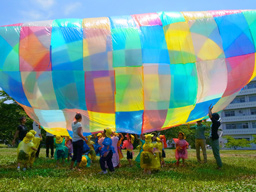
The first and second year students are introduced to the elementary skills of drawing, painting, sculpture, visual design and crafts. Students are also required to learn and acquire a fair perspective over the history of both Japanese and Western arts. After the third year, individual studies are directed into the areas of creative art and topics of art education. Throughout the years, several occasions are provided for the students to work together with school children, thereby to practice some of the vocational aptitudes of art education.
Staff
- NOMURA Yukihiro, Professor
- KASAI Eiji, Professor
- YAMAMOTO Masayuki, Professor
- HAYASE Daisuke, Associate Professor
- YAMADA Yuito, Assistant Professor
Health & Physical Education
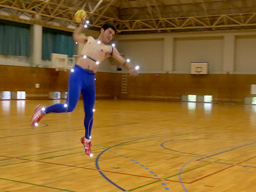
This course will illustrate how one's life can be enriched through proper health and demonstrate how exercises can lead to a prolongation of one's life. The curriculum has been designed to cover a broad spectrum of basic issues from the study of the human body and its functions, analytical studies, special features of exercise and psychology, etc., to such issues as general mental development of time interests, etc., in the aged and in our social environment. Students will be put on a regimen of exercise activities and develop the knowledge and skills to show how it is possible to maintain and restore one's power and vitality in both the schools and in society.
Staff
- SUGIMORI Hiroyuki, Professor
- KUMAGAI Kayo, Professor
- KASUGA Kosyo, Professor
- UEDA Shinya, Associate Professor
- HAYASHI Ryohei, Associate Professor
Technology Education
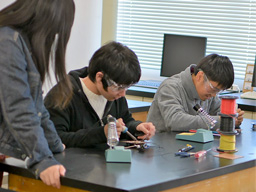
For the first three years, students will acquire the basic knowledge and skills of such activities as woodworking, metalworking, mechanical engineering, electricity, electronics, information technology, gardening, and technology education teaching methodologies. From the middle of their junior year, students will select an activity and produce a graduation thesis on their chosen topic. Many graduates have become junior high school technology education instructors, and they have reported that the years spent studying in this department helped them to master technology education.
Staff
- KOHARA Mitsuhiro, Professor
- FUKUOKA Daisuke, Professor
- FUNAKOSHI Hisatoshi, Professor
- NAKATA Toshiya, Associate Professor
- IWASAKI Tasuku, Assistant Professor
Home Economics Education

This course aims to provide th e knowledge and skills to discover, perceive, infer and act on the problems of lifestyle in today's world. Students will also develop the skills to design a research study through enhanced understanding of the ways to improve one's own personal lifestyle. The curriculum is designed to provide a comprehensive view of the fields of home economics from the interrelationships between clothing, food, housing, home management, and home economics teaching methodologies to broader issue such as the human condition, society, and the environment including lifestyle cultures. The graduation thesis students produce will be the culmination of their.
Staff
- OYABU Chiho, Professor
- IMAMURA Mitsuyuki, Professor
- KUBO Kazuhiro, Professor
- SUGIYAMA Mao, Associate Professor
- SHIBATA Naomi, Associate Professor
English Education
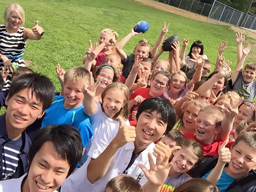
The Department of English Education aims to produce teachers who can meet the needs of both schools and employers in a modern globalized society. Approximately 70% of our graduates go on to become teachers, and the remainder either become public employees or choose to work in the private sector. The first three years of the course are spent learning the basic knowledge and skills needed to be a professional English educator. The course covers a wide variety of topics including linguistics, teaching methodology, communication, and literature. We also offer an extensive program of school visits, with classroom observations beginning in the first semester of the first year. In their third year, all students spend one month teaching at a junior high school and one month teaching at an elementary school. Students spend their final year completing their graduation thesis, and many also choose to take part in one of our internship projects at a local school.
Staff
- TATSUMI Toru, Professor
- David Barker, Professor
- NAKA Kiyoshi, Professor
- TAKIZAWA Hiroto, Associate Professor
- IIDA Yasuhiro, Associate Professor
- HAYASHI Hikari, Assistant Professor
School Education
Fundamentals of Education
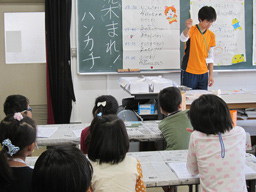
The goal of this course is to provide a comprehensive perspective on school education issues including the process of human social interactions. In particular, students study such technical fields as comparative education, history of education, education systems, educational sociology, social education, and so on. The course is especially designed to obtain a teaching certificate as an elementary school instructor or as an instructor of disabled children. One can also pursue further, deeper technical studies on issues affecting the field of education. In addition, it is possible to obtain teacher certification at the junior and senior high school levels.
Staff
- MASHIKO Norifumi, Professor
- MATSUBARA Masaya, professor
- IMAI Ako, Associate Professor
- HASEGAWA Tetsuya, Associate Professor
Educational Psychology
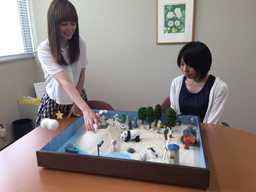
The goal of this course is to provide a clear, understanding of social issues especially for education through the psychology of cognition, emotion, and behavior, and equipped with this knowledge, be of service for the welfare of the people. This task is accomplished by developing a psychological perspective of the methods and history of various fields of psychology, culminating in a relevant, applicable graduation thesis.
Staff
- BEPPU Satoshi, Professor
- ITOH Munechika, Professor
- TSUKIMOTO Takashi, Associate Professor
- MATSUMOTO Takuma, Associate Professor
- ITAKURA Norimasa, Associate Professor
- KOMURA Maho, Assistant Professor
Special Needs Education
Students will acquire theoretical and practical knowledge and skills related to the education of the physically and mentally disabled, psychology, and medical science. Many graduates have become junior high school instructors by obtaining both an elementary school teaching certificate and disabled child teaching certificate. While most graduates become instructors, it is also possible to find employment at welfare institutions or in the general business community.
Staff
- MURASE Shinobu, Professor
- HIRASAWA Noriko, Professor
- SAKAMOTO Yutaka, Professor
- JINNO Yukio, Associate Professor
- SUZUKI Yoshitaka, Assistant Professor
